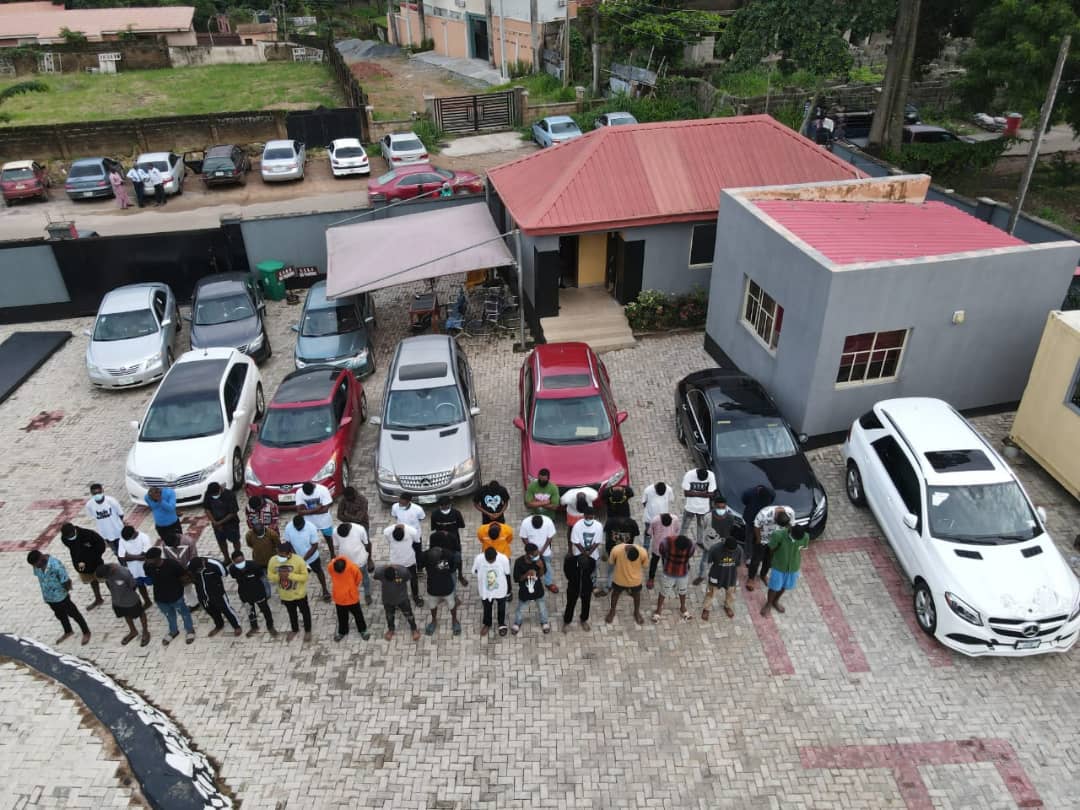
The Economic and Financial Crimes Commission, EFCC, has warned hotel owners across the country to be wary of allowing internet fraudsters to congregate or hibernate around their facilities.
The Commission gave the warning on Tuesday, September 14, 2021 on the heels on an operation by the Ibadan Zonal Command of the agency that led to the arrest of 56 suspected internet fraudsters in Abeokuta, Ogun state.
The suspects include: Garfar Olamide Taiwo, Fadimaye Habeeb, Badmus Idris, Samuel Victor, Seun Fuad, Alli Isaac, Oyeleke Mubarak, Bolu Soetan, Koleosho Eniola, Saheed Abidemi, Olaewe Tosin, Ayedun Idowu, Oniyitan Ayomide, Akinlabi Precious, Gbadebo Sultan, Adeyemi Habeeb, Balogun Hassan, Sulaimon Ayub Damilare, Akinsola Usman.
Others are; Ajibola Femi Sodiya, Ridwan Alani, Olusesi Lanre, Eniatimo Oludare, Taiwo Opeyemi, Akindele Kabiru Johnson Hammed, Idowu Gabriel, Adekanmi Adejumo, Peter Babatunde, Okeowo Sunday, Abudu Habeeb, Sabair Rasaq, Ademuyiwa Basit, Toriola Opeyemi, Babayode Abiola, Agbaje Habeeb, Sorinola Oluwatobiloba, Abiodun Elegbede, Kayode Daniel ,Lawal Alabi, Oyewole Korede, Aberuagba Gafar, Adekunle Emmanuel, Okunade Azeez, and Ojediran Sodiq.
They were apprehended at their hideouts which happened to be popular hotels in the ancient city. The operation which was based on verified intelligence backed by weeks of surveillance was nearly frustrated by the hotel owners who employed various antics, including shutting down power supply, to enable some of the suspects to escape arrest.
Despite the lack of cooperation by the hotel owners, the operatives demonstrated professionalism in ensuring that no one was hurt nor property damaged during the operations, contrary to the narrative in a section of the media.
Nevertheless, the action of the hoteliers amounts to deliberate sabotage and obstruction of law enforcement officers, an offence punishable by Section 38 (2) (b) of the Economic and Financial Crimes Commission (Establishment) Act, 2004.
The Commission has observed a worrying pattern of cold complicity by hospitality entrepreneurs who appear to be hands-in-gloves with suspected fraudsters by housing them over long spells and making internet facilities available to them.
While the argument is being made in certain quarters that hoteliers as business people have no means of determining who a fraudster is before allowing them to lodge in their facilities that position runs counter to the law.
Section 3 of the Advance Fee Fraud And Other Related Offences Act, 2006 provides for a prison term of between five and 15 years without option of fine for any person who permits his premises to be used for any offence under the Act.
EFCC will therefore not tolerate situations where hotel owners or managers not only permit fraudsters to use their facilities but also deliberately shield them from arrest by frustrating law enforcement on such premises.
If the hoteliers are not enablers of the alleged crimes, as some have demonstrated by offering information to the Commission, they are under obligation to cooperate with law enforcement officers carrying out their lawful duties. To act otherwise would tantamount to willingly becoming enablers to fraud.
Meanwhile, ten exotic cars, dozens of mobile phones, laptops and several incriminating documents were recovered from the suspected fraudsters arrested in Abeokuta.
They will be arraigned in court as soon as the investigation is concluded.

Comments